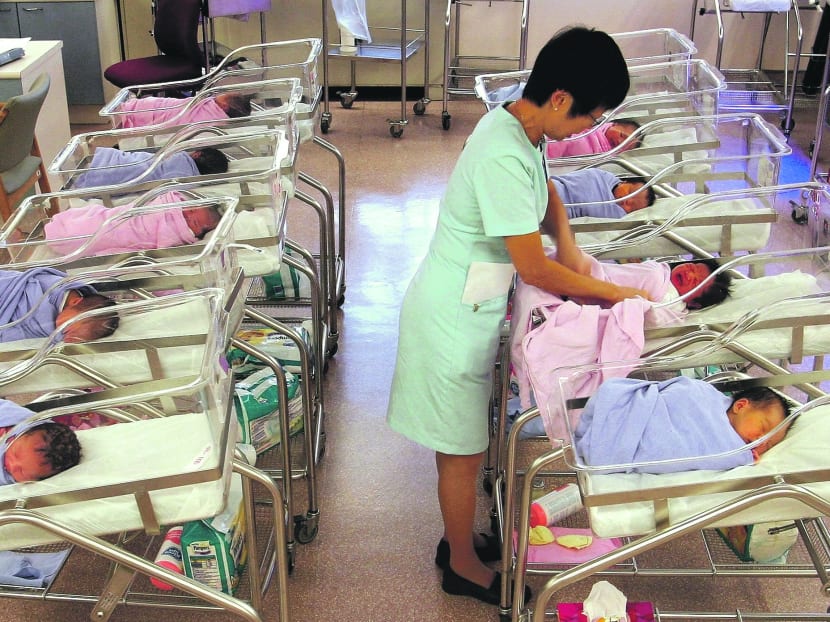S’pore has only 25-year window to get demographic balance right, PM warns
SINGAPORE — The Republic has a 25-year window to raise birth rates and maintain a balance between the proportion of foreigners and Singaporeans. Otherwise, it could be in a “very tight spot” like Japan, Prime Minister Lee Hsien Loong warned in a wide-ranging interview with Time magazine, which was conducted on July 10 and published today (July 23).
SINGAPORE — The Republic has a 25-year window to raise birth rates and maintain a balance between the proportion of foreigners and Singaporeans. Otherwise, it could be in a “very tight spot” like Japan, Prime Minister Lee Hsien Loong warned in a wide-ranging interview with Time magazine, which was conducted on July 10 and published today (July 23).
Reiterating the size of the demographic and existential challenges for Singapore in the medium and long term, Mr Lee also flagged the dangers of a brain drain and schisms within the population.
“In 25 years, if we can’t get our demography balance between our births and immigration of foreign workers, we will be in a very tight spot like the Japanese are,” he said.
“Now, if you take a 50-year time frame, then I think, beyond individual policy, the most important thing is the sense of national identity because before you can make any policies and get people to say ‘I want to do this or the other’ ... first, people must feel that we are Singaporeans, we want to be together, we are different from the others and we are special.”
Mr Lee said it was essential to have a Singapore core in society. “Because if you don’t ... you can top up the numbers, but you are no longer Singapore ... We can issue everybody red passports, but where is the continuity?”
With about a million foreign workers here, Mr Lee said, this is “not a small number” and he did not think policymakers could “go a lot beyond”.
To achieve a balance would entail Singaporeans having enough children, stressed the Prime Minster. “Which is why I say (in) 25 years, demography is very important.”
With Singaporeans generally well educated and able to speak English, the world is their oyster.
“And it’s not just talking about 5, 10 per cent at the top who are like that, but 30, 40, maybe even 50 per cent who are welcomed (in other countries),” Mr Lee noted.
“If the successful ones mostly leave, we’re going to be depleted. And if it goes beyond the successful ones, we’ll be shrunken.”
Singapore must also not assume that internal schisms cannot exist, Mr Lee said. “Religion is a stronger motivator than ever before. It’s not just in Singapore, but all over the word ... It can be values, LGBT (lesbian, gay, bisexual and transgender) issues can become a divisive issue,” he added. “It can be based on ethnic and external relations. We are mostly Chinese, China becomes a great power. What is the impact on our people’s thinking and perspectives on the world and how does that impact the Malays and Indians who are non-Chinese?”
About three weeks ago, Mr Lee made similar points at a public lecture where he sketched out the challenges facing Singapore over several time horizons: The economy in 10 years, population in 25 years, and national identity in 50 years.
Today, Mr Lee also noted how Singapore’s situation today is different from that of its early years. “When we started out, backs were to the wall. Today, your backs are not to the wall ... The tactics we were able to use in the 1960s, 1970s — ‘Let’s have a campaign, mobilise everybody’ and therefore, social pressure — stop littering or stop spitting, or be courteous to one another ... I am not sure that kind of approach will work anymore.”
Society has become “much more variegated”, with more interests and preoccupations among Singaporeans. “To find that common ground to stand together ... I think that’s quite a challenge,” he said.
“The conventional wisdom in the West is that you let a hundred flowers bloom... We really don’t quite believe that. You do have to tend the garden to make it flower and the challenge will be how we can do that while having a greater degree of free play and yet not have things end up in a bad outcome.”
FREEDOM OF EXPRESSION
In response to the topic of court cases involving bloggers Amos Yee and Roy Ngerng, Mr Lee said there is “always a balance between freedom and the rule of law and freedom is never totally unlimited”.
“In our society, which is multiracial and multi-religious, giving offence to another religious or ethnic group, race, language or religion is always a very serious matter. In this case, he’s (Amos) a 16-year-old, so you have to deal with it appropriately because he’s (of a) young age.”
Mr Lee did not agree with the interviewers’ suggestion that the offending video clip put up by the teenager would have “disappeared into the ether” if the authorities had not acted. “It had gone viral, it was an issue. A lot of people have filed police complaints and do you do something or do you not do something?” he said.
On the defamation suit against Mr Ngerng, Mr Lee stressed that “you can criticise the Government as much as you like on policy, on substance, on competence”. “But if you make a defamatory allegation that the Prime Minister is guilty of criminal misappropriation of pension funds of Singaporeans, that’s a very serious matter. If it’s true, the Prime Minister should be charged and jailed,” he said.
“If it’s not true, the matter must be clarified and the best way to do that is by settling in court,” added Mr Lee.







